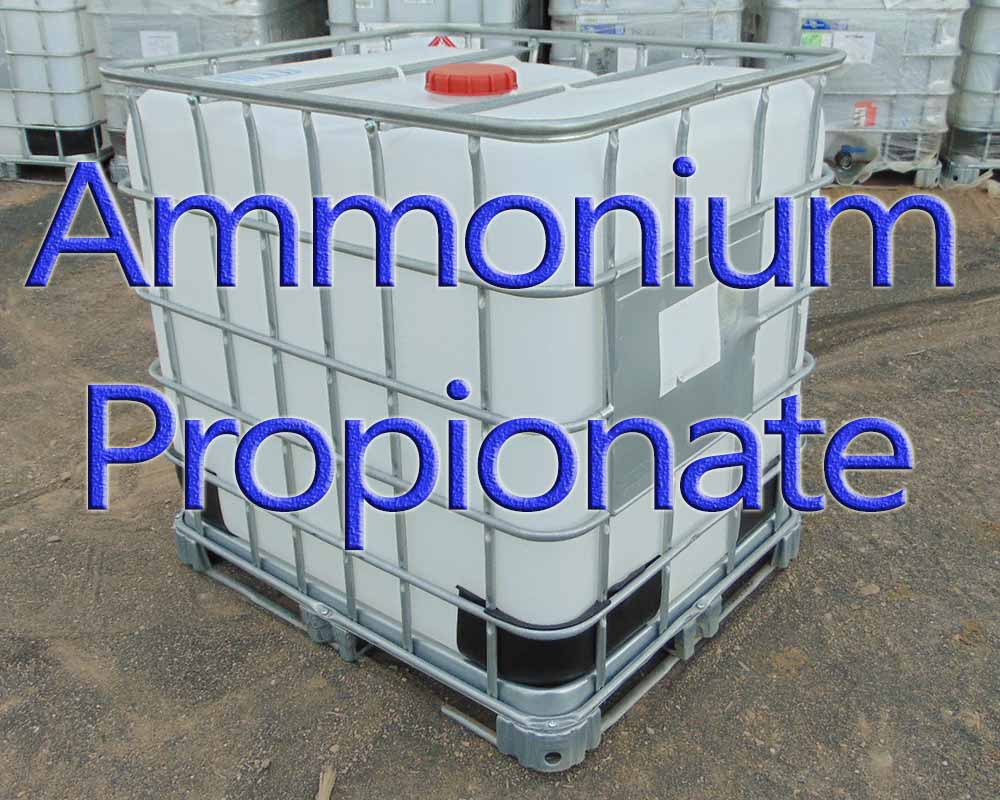1. Chemical Composition:
Chemical Name: Ammonium Propionate
Chemical Formula: C3H7COONH4
Molecular Weight: 115.11 g/mol
2. Physical Properties:
Appearance: White crystalline powder or granules
Solubility: Soluble in water
Melting Point: Decomposes before melting
Density: Varies depending on the form (granules, powder)
3. Functionality in Feed Industry:
Preservative Action:
Ammonium propionate is utilized in the feed industry as a preservative to inhibit the growth of molds and bacteria in animal feeds. Its preservative properties contribute to extending the shelf life of feed products, preventing spoilage and maintaining the nutritional quality.
pH Regulation:
Ammonium propionate acts as a pH regulator in feed, helping to maintain an environment that inhibits the growth of specific microorganisms. This contributes to the overall stability and safety of the feed.
Reducing Agent:
As a reducing agent, ammonium propionate can influence oxidative processes in feed, helping to prevent rancidity and the degradation of nutrients.
4. Mechanism of Action:
Ammonium propionate functions by inhibiting the growth of molds and bacteria through its antimicrobial properties. It disrupts their metabolic processes, preventing proliferation and the production of harmful by-products.
5. Dosage and Application:
The recommended dosage of ammonium propionate in feed formulations depends on factors such as feed composition, moisture content, and storage conditions.
It is typically added during the mixing stage of feed production to ensure uniform distribution.
6. Regulatory Compliance:
Ammonium propionate is generally recognized as safe (GRAS) when used in accordance with good manufacturing practices.
Compliance with local and international regulations, including maximum residue limits, is crucial.
7. Safety Considerations:
Ammonium propionate is considered safe for use in animal feeds when applied within recommended concentrations.
Following safety guidelines is essential to avoid exceeding permissible limits.
8. Packaging and Storage:
Ammonium propionate is commonly available in bags or containers suitable for safe storage and transportation.
Proper storage conditions include a cool, dry place away from direct sunlight.
9. Conclusion:
Ammonium propionate serves as a preservative in the feed industry, ensuring the quality and safety of animal feeds by inhibiting the growth of molds and bacteria. Its pH-regulating and reducing agent properties further enhance its efficacy in preserving feed products. Compliance with regulatory standards and proper application are essential for ensuring its effectiveness in feed formulations.
📌 Detailed Introduction of Ammonium Propionate
✔ What is Ammonium Propionate?
Ammonium Propionate (NH₄C₃H₅O₂) is a colorless to white crystalline powder or granule widely used in the feed, food, and industrial sectors. It is formed by neutralizing propionic acid with ammonia. Ammonium propionate has mild antifungal properties, which make it an excellent preservative in various formulations.
📌 Production Method & Raw Materials
✔ Raw Materials:
Propionic Acid (CH₃CH₂COOH) – Main reactant
Ammonia (NH₃) – Neutralizing agent
✔ Production Process:
Neutralization: Propionic acid reacts with ammonia to form ammonium propionate in an aqueous solution.
Crystallization & Drying: The solution is evaporated, and ammonium propionate crystals are formed, then dried to a fine powder or granular form.
Packaging & Distribution: The final product is packed in moisture-proof containers for distribution in bulk or as customized packages.
📌 Applications of Ammonium Propionate
✔ Feed Additive
Used as an antifungal agent to prevent mold and bacterial growth in animal feed, ensuring better feed quality and shelf life.
Improves digestive health and nutrient absorption in livestock and poultry.
Helps maintain freshness in pelleted animal feeds.
✔ Food Industry
Acts as a preservative in baked goods to prevent mold and spoilage.
Enhances the shelf-life of processed foods without affecting flavor or texture.
Used in cheese production to improve preservation.
✔ Industrial Applications
Utilized in chemical synthesis as a buffering agent and pH stabilizer in various industrial processes.
Works as an antimicrobial agent in cosmetic formulations.
Used in cleaning products for surface sanitization.
✔ Agricultural Use
Used in crop protection products to control mold and fungi.
Improves the quality and storage life of silage and other animal feeds.
📌 Key Benefits of Ammonium Propionate
✅ Effective Preservative – Prevents mold, bacteria, and fungal growth in both animal feed and food products.
✅ Animal Health Benefits – Enhances digestive efficiency and nutrient absorption.
✅ Non-Toxic & Safe – Safe for use in feed, food, and industrial products.
✅ Versatile Chemical – Ideal for a wide range of industrial and agricultural applications.
✅ Improves Shelf Life – Extends shelf life of feed and food products.
📌 Product Specifications
| Property | Specification |
|---|---|
| Chemical Formula | NH₄C₃H₅O₂ |
| Appearance | White crystalline powder or granules |
| Purity (%) | ≥ 98.0% |
| Moisture Content (%) | ≤ 2.0% |
| Solubility | Soluble in water |
| pH (5% Solution) | 6.5 - 7.5 |
| Heavy Metals (ppm) | ≤ 10 |
| Insoluble Matter (%) | ≤ 0.2% |
| Packaging | 25kg bags or customized |
| Shelf Life | 24 months |
📌 Famous Ammonium Propionate Brands Worldwide
Eastman Chemical Company – USA
Perstorp Group – Sweden
Jiangsu Khonor Chemicals Co., Limited – China
Lonza Group – Switzerland
📌 Why Choose Jiangsu Khonor Chemicals Co., Limited for Ammonium Propionate?
✔ High-Purity Ammonium Propionate – Meets the standards for feed, food, and industrial applications.
✔ Competitive Pricing – Providing cost-effective solutions for your bulk supply needs.
✔ Reliable Supply Chain – Timely delivery and consistent quality assurance for all orders.
✔ Customized Solutions – Tailored packaging and formulations to meet your specific requirements.
📌 Order Ammonium Propionate Today!
Looking for a trusted supplier of Ammonium Propionate? Jiangsu Khonor Chemicals Co., Limited offers high-quality ammonium propionate for feed, food preservation, chemical synthesis, and industrial applications.
📞 Contact us now for pricing, bulk orders, and technical details!

